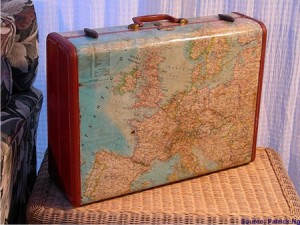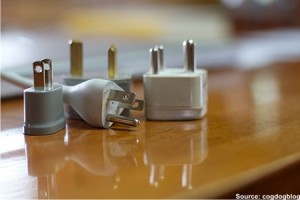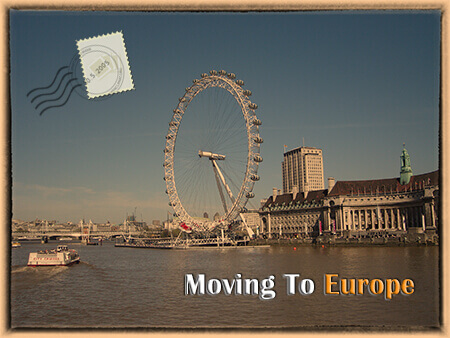It is no secret that international moving is much more complicated that moving across the country. And regardless of whether you are going abroad to study, work or retire, there are numerous issues to be tackled and big decisions to be made before the moving day comes.
If your destination continent happens to be Europe, then you may be in for a real treat. Although it is the world’s second smallest continent by surface area, Europe accommodates 733 million people and offers a dazzling array of rich cultures and diverse languages. Here are the major points you need to know if you are moving to Europe.
International relocation services
Contact several experienced international moving companies, ask them to perform a visual survey of your home and to issue you a written on-site estimate. Have in mind that the moving price to overseas destinations is based on weight and cubic measurement of your packed household goods. The cost also includes air or ocean transportation charges, packing and unpacking services, but excludes additional charges for storage, customs duties, liability coverage, etc.
Packing

The professional mover of your choice will come to your house on the assigned date with loads of various packing supplies and do the packing for you since you are not allowed to do it on your own. The packing process for overseas destinations has its specifics – all household items must be carefully wrapped and arranged inside big waterproof boxes made of plywood, metal or fiberglass. These boxes are then fitted into 20 ft or 40 ft ship containers.
There are certain household items that you may not ship to another country, such as specific foods, liquor, firearms or ammunition. It’s best if you contact the nearest consular or embassy of the destination country and request a copy of their customs regulation in order to know which specific articles are illegal to enter the respective country’s territory.
It is crucial that you remember to pre-pack your travel baggage (suitcases, briefcases, hand bags, etc.) before the arrival of the packers and movers and hide it out of sight. Make sure ALL your valuable items, such as cash, debit/credits cards, jewelry, important documents (passports, driver licenses, tickets and so on) are traveling with you so lock them away in a safe place. This way you will avoid unfortunate incidents like having your plane tickets and passports packed with the rest of your household stuff and placed in the container. And, once the moving company has left, make sure you take your baggage with you and not leave it hidden away at home.
Required documentation
It is of paramount importance that you possess and safeguard all the necessary documents when relocating to Europe. Make sure you apply for the ones you don’t have yet as early as possible. Such documents should NEVER leave your side and may include: passports, certificates of registration, visas, residence and work permits, medical and immunization certificates, international driver’s licenses and so on.
Pets

Moving overseas with pets is an arduous task. However, help for a smooth relocation to Europe with your pet is just around the corner. First, contact the Veterinary Services Area Office of the state from which your pet will be transported. Your Veterinarian-in-Charge can provide you with the current regulations, tests, required forms, documents, and inspections. Secondly, get in touch with the destination country’s consulate for more information about whether or not you meet the requirements for importing your animal companion. And finally, you need to familiarize yourself with the International Animal Export Regulations by Destination Country provided by the U.S. Department of Agriculture.
Automobile
Shipping your car to the Old Continent is a fairly simply but often costly procedure. All you need to do is contact an international shipping company and provide them with the dimensions of your car, as well as the make, the model and its serial number. The shipping company will then quote you a price for the service, including freight and marine insurance. Another important step is to prepare your automobile for the transportation process – take photos of its interior and exterior as a proof of its current condition, remove all of your personal belongings from the car (they are not be insured during shipping), check the tires and charge the battery. If your car has any mechanical problems, you should inform the shipping company about them.
Also, read carefully the contract (aka Bill of Lading) before agreeing to its conditions by signing it. However, think hard whether it’s really worth taking your vehicle with you – the public transportation in Europe is well developed and you may not need your car there after all.
Expatriate assistance
It is a well-known fact that thousands of Americans live in Europe and there are more or less substantial communities of expatriates in each European country. Once you arrive in your destination, look for Americans who have preferably lived there for some years and ask them for insiders’ tips on anything connected to the way things work in the country or the way locals think and behave. Such straight-from-horse’s-mouth information is often priceless in its relevance and practicality.
Electricity

Electricity in Europe is different from the one in North America. The major differences are that the voltage is twice as high (U.S. voltage: 110 V, European voltage: 220 V) and the frequency is lower (U.S. frequency: 60 Hz, European frequency: 50 Hz). This fact automatically renders most of your electrical appliances useless in Europe unless they are equipped with dual voltage switches. Read the electrical nameplate of your device – if it is rated and labeled for 220 volts and 50 Hz, then you can safely take it with you.
Depending on the European country, you will need to buy in advance a specific type of electrical plug adapters for the appliances you do ship with you (your laptop, for example). The Schuko grounded plug is the standard plug for most countries in Europe, the UK and Ireland grounded plug is used all over both islands and the Euro plug can be used in Italy and Switzerland.
Systems of measurement
Every European country (except Great Britain) uses the metric system. If you’re not familiar with it, you’ll have to get used to it fast. Otherwise, things just won’t make any sense to you. American ounces, pounds and (short) tons suddenly become milligrams, kilograms and (long) tons in Europe. Fluid ounces, pints, quarts and gallons become milliliters, liters and tons, whereas inches, feet, yards, and miles are centimeters, meters, and kilometers. America uses the Fahrenheit temperature scale where water freezes at 32°F and boils at 212°F. In Europe, however, water freezes at 0°C and boils at 100°C on the Celsius scale.
Time zones
Europe is about a third of the way around the world toward the east and the sun rises there before it does in America. This is why Europe will always be ahead clockwise. There are four time zones on the Old Continent: Western European Time, Central European Time, Eastern European Time and Moscow Time.
You can read more about Coordinated Universal Time (UTC) and how to successfully convert from one time to another here.
Languages

Many different languages are spoken throughout Europe. Most of them belong to the Indo-European language family, which is then divided into a number of branches. Each country has its official language, and more than one language is in use in at least half of them. And even though English may be enough for basic communication in almost any European country, one of your top priorities is to start learning the local language as soon as possible. When you speak English, try to speak slowly and clearly, and at the same time keep your ears tuned for the distinctive accented replies.
Europe is one of the most exciting places to live, work, retire or just to visit – each separate country offers something amazingly unique. The best piece of advice you will ever get is to start your moving preparations as early as the decision to relocate to Europe has been made. Finding a professional overseas moving company and making the necessary arrangements is probably your first concern. Moreover, reading additional extensive information online about your destination country will greatly aid you to feel less “alien” when you arrive at your new home.


